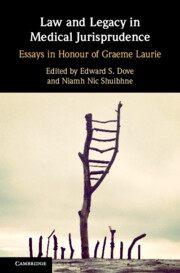Book contents
- Law and Legacy in Medical Jurisprudence
- Law and Legacy in Medical Jurisprudence
- Copyright page
- Contents
- Contributors
- Foreword
- Preface
- Table of Cases
- Table of Legislation
- Abbreviations
- Introduction
- 1 ‘Doing’ Medical Law and Ethics
- 2 A Philosopher Looks at ‘Law and Medical Ethics’
- 3 Thinking Outside the Box
- 4 The Public Interest in Health Research
- 5 Taking the Legacy Forward
- 6 On the Importance of Impact on Policy and Legacy
- 7 Breathing Life into Law
- 8 Biomedical Research Policy
- 9 The Burden of History
- 10 Body Parts and Baleful Stars?
- 11 The Legacy of the Warnock Report
- 12 ‘Only Time Will Tell’
- 13 Integrating the Biological and the Technological
- 14 UK Biobank and the Legal Regulation of Genetic Research
- 15 Overcoming Regulatory Impasse in Stem Cell Research and Advanced Therapy Medicines in Argentina through Shared Norms and Values
- 16 Institutions, Interpretive Communities and Legacy in Decision-Making
- 17 Towards a New Privacy
- 18 A Tale of Two Legacies
- Afterword
- Index
Introduction
Published online by Cambridge University Press: 23 December 2021
- Law and Legacy in Medical Jurisprudence
- Law and Legacy in Medical Jurisprudence
- Copyright page
- Contents
- Contributors
- Foreword
- Preface
- Table of Cases
- Table of Legislation
- Abbreviations
- Introduction
- 1 ‘Doing’ Medical Law and Ethics
- 2 A Philosopher Looks at ‘Law and Medical Ethics’
- 3 Thinking Outside the Box
- 4 The Public Interest in Health Research
- 5 Taking the Legacy Forward
- 6 On the Importance of Impact on Policy and Legacy
- 7 Breathing Life into Law
- 8 Biomedical Research Policy
- 9 The Burden of History
- 10 Body Parts and Baleful Stars?
- 11 The Legacy of the Warnock Report
- 12 ‘Only Time Will Tell’
- 13 Integrating the Biological and the Technological
- 14 UK Biobank and the Legal Regulation of Genetic Research
- 15 Overcoming Regulatory Impasse in Stem Cell Research and Advanced Therapy Medicines in Argentina through Shared Norms and Values
- 16 Institutions, Interpretive Communities and Legacy in Decision-Making
- 17 Towards a New Privacy
- 18 A Tale of Two Legacies
- Afterword
- Index
Summary
Graeme Laurie stepped down from the Chair in Medical Jurisprudence at the University of Edinburgh in 2019. This edited collection pays tribute to his extraordinary contributions to the field. Graeme has often spoken about the importance of ‘legacy’ in academic work and has forged a remarkable intellectual legacy of his own, notably through his work on genetic privacy, human tissue and information governance, and the regulatory salience of the concept of liminality. The chapters in this volume animate the concept of legacy as a lens of analysis for the study and practice of medical jurisprudence. In this light, legacy reveals characteristics of both benefit and burden, as both a facilitator of and an encumbrance to the development of law, policy and regulation. Overall, the contributions reconcile the ideas of legacy and responsiveness and show that both dimensions are critical to achieve and sustain the health of medical jurisprudence itself as a dynamic, interdisciplinary and policy-engaged field of thinking.
- Type
- Chapter
- Information
- Law and Legacy in Medical JurisprudenceEssays in Honour of Graeme Laurie, pp. 1 - 20Publisher: Cambridge University PressPrint publication year: 2022

